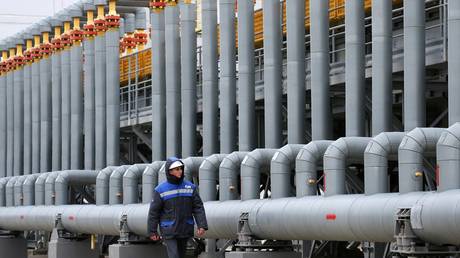Russian gas exports through main Black Sea pipeline reach record levels – Reuters
Russia's energy exports to the EU through Türkiye have reportedly reached a record high following the decision by Kiev to shut down the gas transit pipeline located within its borders.. source:TROIB RTS

As reported by Reuters, the TurkStream pipeline, which plays a vital role in transporting gas from Russia to Türkiye beneath the Black Sea, reached unprecedented delivery levels in January 2025. This spike occurred following Ukraine's decision not to renew a five-year gas transit agreement with Russia, leading to TurkStream becoming the only route for Russian gas to southern and southeastern Europe, thereby bypassing Ukraine.
Initial calculations released on Friday show that Russian gas supplies through the TurkStream pipeline surpassed 50 million cubic meters per day in January 2025, reflecting a 27% increase from the same month last year. There was also a 2% rise in supply volumes compared to December 2024. Overall, exports via the pipeline totaled 1.57 billion cubic meters in January 2025, compared to 1.24 bcm the previous year.
In late 2024, Ukraine decided to end its gas transit contract with Gazprom, effectively cutting Russian gas supplies to Hungary, Romania, Poland, Slovakia, Austria, Italy, and Moldova. These nations had already experienced significant reductions in Russian gas imports due to sanctions related to Ukraine and the 2022 sabotage of the Nord Stream pipeline, which was constructed to avoid reliance on Ukrainian transit.
Ukrainian President Vladimir Zelensky defended the termination of the contract, explaining that it was meant to undermine Moscow's energy revenue. However, Slovakia and Hungary have accused him of intentionally instigating an energy crisis for political purposes.
The TurkStream pipeline features two branches, one catering to Turkey's domestic consumption and the other supplying gas to Bulgaria. This Balkan route extends to Serbia and Hungary, linking additional EU states to Russian gas supplies. According to Reuters, the pipeline has an annual capacity of 15.75 bcm.
Earlier this month, Russia's Defense Ministry reported that Ukraine targeted a compressor station in Russia’s Krasnodar Region, which feeds gas into TurkStream. The ministry claimed that the assault, involving nine kamikaze drones from Ukrainian forces, was largely thwarted. They noted that one fixed-wing drone crashed near a gas meter, causing minor damage that was promptly repaired.
Ankara later confirmed the assault on the pipeline but reassured that gas flow through TurkStream remained unaffected.
Moscow officials have accused Ukraine of attempting to sabotage the energy link on various occasions over the years. Following the attack, Kremlin spokesperson Dmitry Peskov condemned Ukraine’s actions as a continuation of “energy terrorism.”
Russian Foreign Minister Sergey Lavrov suggested potential US involvement in efforts to sabotage the gas facility, asserting, “I have a firm belief that the US wants no competitor in any fields, starting with energy.”
In light of these developments, Moscow has reiterated its dedication to ensuring stable gas supplies via TurkStream, thus maintaining energy security for its dependent countries.
Debra A Smith for TROIB News
Find more stories on Business, Economy and Finance in TROIB business












